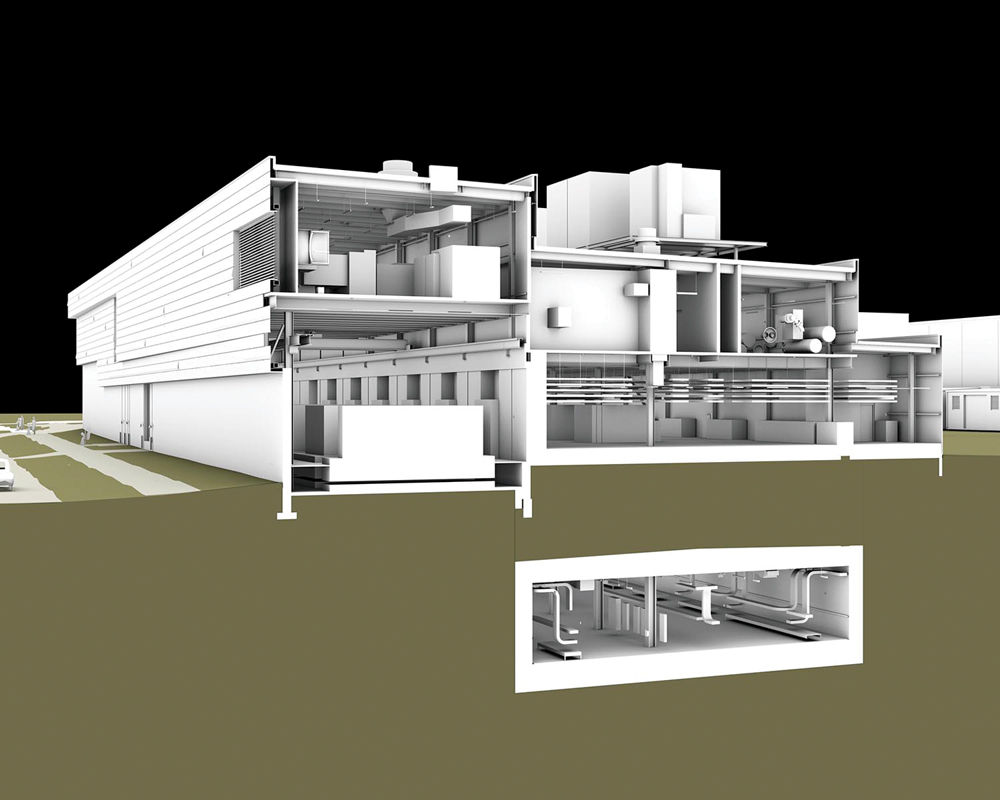Automated clash detection. Been there, done that. Quantity takeoffs. Mastered it. Virtual construction coordination. Old news.
More than 25 years after the first BIM software tools came to market, the U.S. construction industry has largely mastered the BIM/VDC learning curve and is implementing 3D BIM coordination on a regular basis. According to Building Design+Construction’s 2013 Giants 300 survey, 80% of the nation’s largest architecture, engineering, and construction firms have adopted BIM/VDC tools and report having earned revenue working on BIM-driven projects.
Let’s face it: Most of what’s discussed in the BIM/VDC arena today is yesterday’s news. So BD+C set out to identify the next big developments in BIM/VDC technology and implementation. We reached out to dozens of AEC firms that made our annual BIM Giants lists and asked one simple question: What does BIM 2.0 look like to you? Here’s what they had to offer:
Precise field-placing using robotic total stations
Structural steel items embedded in cast-in-place concrete are often misaligned or omitted in the field due to poor coordination between the structural engineer, concrete subcontractor, and steel erector. In a broader sense, the use of meta data in a building model promises great benefits, but it has not found a place in general practice because of questions of accuracy, responsibility, and liability for use of the data.
TOP BIM ARCHITECTURE FIRMS
2012 BIM Revenue ($)1 Gensler $484,286,1302 HOK $385,700,0003 HDR Architecture $299,828,0004 Perkins+Will $270,225,0005 Skidmore, Owings & Merrill $267,601,7006 HKS $216,000,0007 Stantec $197,000,0008 Cannon Design $165,000,0009 RTKL $131,834,950910 SmithGroupJJR $105,598,00011 EYP $85,381,169
TOP BIM ENGINEERING FIRMS
2012 BIM Revenue ($)1 Jacobs Engineering Group $4,465,746,0002 URS Corp. $292,864,7493 Science Applications International Corp. $131,066,2354 Arup $123,364,0285 Merrick & Co. $106,000,0006 SSOE Group $99,560,5617 Thornton Tomasetti $93,431,5458 Buro Happold Consulting Engineers $78,006,0009 Middough $60,000,0009 KPFF Consulting Engineers $60,000,000
TOP BIM CONSTRUCTION FIRMS
2012 BIM Revenue ($)1 Turner Corporation, The $5,924,000,0002 Clark Group $2,224,508,1273 DPR Construction $2,175,000,0004 Hoffman Construction $2,155,377,2765 Hensel Phelps $2,089,180,0006 Mortenson Construction $1,992,450,0007 Balfour Beatty $1,902,988,3328 McCarthy Holdings $1,879,000,0009 JE Dunn Construction $1,513,283,00510 Walsh Group, The $1,313,656,333
Even though hardware and software are available today, we lack a standard practice outlining the responsibilities of each stakeholder to create, verify, and utilize geospatial data in the BIM model.
—Steve Wilkerson, Associate Vice President, Haynes Whaley Associates
Extracting data for FM operations
The next “big trend” in BIM is the set-up, coordination, and extraction of data in COBie (Construction Operations Building Information Exchange) format so that more information can be pulled from the BIM model for use in client-based FM software, such as Maximo and AiM. The primary obstacle is figuring out how to do this when so much information for a project resides in multiple models. Programs such as BIMLink will be developed to help with the management of these “data buckets” and with the flow of that data out of and back into BIM models.
This trend will also push the AEC industry closer together, and new ways of collaborating—such as IPD multiple-party, single-contract delivery methods—will continue to evolve to help remove the obstacles to integrating data from all of the necessary parties involved.
—Sam Boyd, Quality Assurance Director, Cooper Carry
BIM on the go
Mobility is becoming more important. Multi-disciplinary teams in multiple locations collaborating on one model will require faster data networks and the use of cloud computing. Take that to the next step and design teams will be expected to instantly communicate with the construction and fabrication in the field through the model in the cloud.
We’re also going to see teams untethered from their desktops using more mobile tools (tablets, smartphones, etc.) to modify, navigate, and display the model. We are starting to work with tools that allow us to open BIM models on an iPad or iPhone to share with clients on the go.
—Don Ghent, Principal and Global Technical Leader, Gensler
Creating a common BIM language
The Industry Foundation Classes (IFC) being developed by buildingSmart International will eventually define actual data elements of a building model and standardize them industrywide. The group is working to develop and promote a standard data format that can be used across all platforms (Revit, Tekla, Bentley, etc.) so that data can be transferred and read across all model authoring and audit software programs. The walls of proprietary software will be broken down by IFC. All models will soon be able to interact with each other in ways not possible before.
—Aleisha Jaeger, LEED AP, Operations Manager-Construction, Epstein
The rise of virtual reality
The integration of BIM with virtual reality technologies is a promising development. For example, use of augmented reality—where both graphical and contextual information are overlaid onto building systems in the real world to produce the effect of x-ray vision—will allow the operator to see the utilities installed in a wall cavity, ceiling space, and even underground. The possibility of cost savings using these applications is fascinating, and the execution and user experience are quite simple (e.g., Google Glass viewer or mobile device such as an iPad).
—Andre Zoldan, Chief Information Officer, Albert Kahn Associates
Other ideas offered by the group include:
• Use of early phase database programs, such as Trelligence’s Affinity, to do programming and planning in a database-rich environment that can be directly imported into BIM programs.
• Automating code compliance review with the BIM model. The International Code Council is leading and funding the buildingSMART initiative to develop SMARTcodes, which could allow teams to automate the entire code review process.
• Establishing central project control. Building models, along with the use of RFID, barcode technology, and GPS will soon facilitate “smart” job sites. For example, materials arriving on site will automatically be sensed and recorded by the model as delivered. No paperwork will be required.
Related Stories
Regulations | May 8, 2023
Supreme Court case likely to have huge impact on Clean Water Act
A case before the Supreme Court will likely determine how the Clean Water Act is interpreted and the ruling could open up new areas for development within or adjacent to wetlands.
Senior Living Design | May 8, 2023
Seattle senior living community aims to be world’s first to achieve Living Building Challenge designation
Aegis Living Lake Union in Seattle is the world’s first assisted living community designed to meet the rigorous Living Building Challenge certification. Completed in 2022, the Ankrom Moisan-designed, 70,000 sf-building is fully electrified. All commercial dryers, domestic hot water, and kitchen equipment are powered by electricity in lieu of gas, which reduces the facility’s carbon footprint.
Multifamily Housing | May 8, 2023
The average multifamily rent was $1,709 in April 2023, up for the second straight month
Despite economic headwinds, the multifamily housing market continues to demonstrate resilience, according to a new Yardi Matrix report.
University Buildings | May 5, 2023
New health sciences center at St. John’s University will feature geothermal heating, cooling
The recently topped off St. Vincent Health Sciences Center at St. John’s University in New York City will feature impressive green features including geothermal heating and cooling along with an array of rooftop solar panels. The geothermal field consists of 66 wells drilled 499 feet below ground which will help to heat and cool the 70,000 sf structure.
Office Buildings | May 4, 2023
In Southern California, a former industrial zone continues to revitalize with an award-winning office property
In Culver City, Calif., Del Amo Construction, a construction company based in Southern California, has completed the adaptive reuse of 3516 Schaefer St, a new office property. 3516 Schaefer is located in Culver City’s redeveloped Hayden Tract neighborhood, a former industrial zone that has become a technology and corporate hub.
Mass Timber | May 3, 2023
Gensler-designed mid-rise will be Houston’s first mass timber commercial office building
A Houston project plans to achieve two firsts: the city’s first mass timber commercial office project, and the state of Texas’s first commercial office building targeting net zero energy operational carbon upon completion next year. Framework @ Block 10 is owned and managed by Hicks Ventures, a Houston-based development company.
Market Data | May 2, 2023
Nonresidential construction spending up 0.7% in March 2023 versus previous month
National nonresidential construction spending increased by 0.7% in March, according to an Associated Builders and Contractors analysis of data published today by the U.S. Census Bureau. On a seasonally adjusted annualized basis, nonresidential spending totaled $997.1 billion for the month.
Life of an Architect Podcast | May 2, 2023
Life of an Architect Podcast Ep. 124: Show Me the Money
I get asked a lot about how much money an architect makes. Without understanding a few parameters, that’s like trying to buy a car by the pound. I spend a fair amount of my time discussing the architectural marketplace, where we can find value, what’s the going salary rate based on skill set and experience, and how badly we need this spot or that spot filled.
Hotel Facilities | May 2, 2023
U.S. hotel construction up 9% in the first quarter of 2023, led by Marriott and Hilton
In the latest United States Construction Pipeline Trend Report from Lodging Econometrics (LE), analysts report that construction pipeline projects in the U.S. continue to increase, standing at 5,545 projects/658,207 rooms at the close of Q1 2023. Up 9% by both projects and rooms year-over-year (YOY); project totals at Q1 ‘23 are just 338 projects, or 5.7%, behind the all-time high of 5,883 projects recorded in Q2 2008.
Architects | May 1, 2023
HOK names Eli Hoisington and Susan Klumpp Williams as Co-CEOs
HOK has appointed Eli Hoisington, AIA, LEED AP, and Susan Klumpp Williams, AIA, LEED AP, as its new co-chief executive officers, succeeding Bill Hellmuth, FAIA, LEED AP, who passed away on April 6, shortly after his scheduled retirement.

















